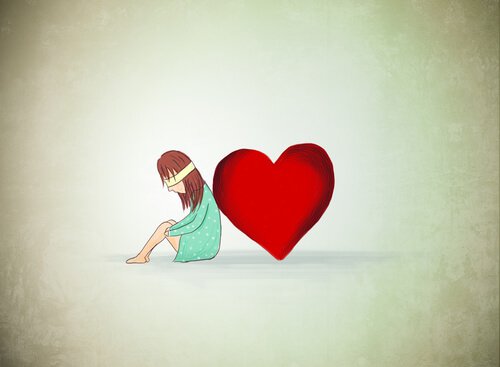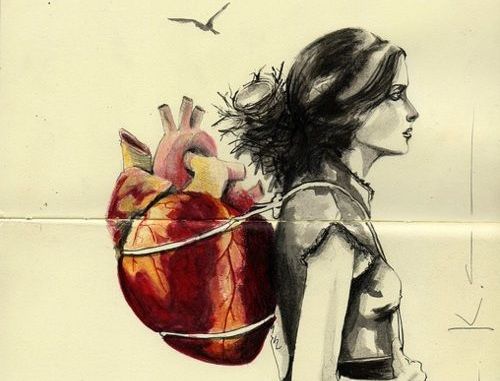Don't Be Fooled by the Blindfold of Love

In some way or another, you’ll end up taking the blindfold off your eyes and using it to make a bow in your hair. When you do this, your face will look more beautiful and your eyes will be freer, more hopeful, and more awake. You’ll discover reality the way you deserve to see it, without covering it up.
Ortega and Gasset once said that “love is like a kind of transitory foolishness, a state of mental angostura and psychic angina.” The celebrated philosophers, in their eagerness to find an explanation for human emotions, probably didn’t see the logic in falling in love and the “blindfold” that often traps us in a sweet fantasy. However, even though it’s hard to wrap our heads around, love does have logic and meaning.
“Love and hatred are not blind, but are blinded by the fire they bear within themselves.”
-Friedrich Nietzsche-
Dr. Robert Epstein from Harvard University stated that when you live part of your life with a blindfold over your eyes, whether it’s in response to an affective relationship or some other personal situation, it shapes your psychological and emotional growth. But we shouldn’t regret this period of time, the energy we invested in it, the dreams we developed, or the emotions we experienced. That would mean renouncing a part of ourselves.
In reality, love is not blind. Sometimes, we actually see more than we should. We see mirages and distorted images that don’t correspond with reality. Seeing life through the heart can have a price, but that’s just another thing you learn in life. And you’d never learn it if you denied yourself the chance to love, to try, to experiment, to take those leaps without a parachute. Sometimes you come away in one piece, and other times you come out a little broken.

You’ve probably let your blindfold fall once or twice
Sometimes we take the blindfold off our eyes. But instead of tying it into a bow and moving on with our heads held high and our gaze alert, we make the same mistakes as before. That is, we love blindly, trust in the dark, grope around, and leave our hearts in other people’s pockets. Why do we do that? Why do we become repeat offenders of captive and painful love?
“But love is blind, and lovers cannot see the pretty follies that themselves commit.”
-William Shakespeare-
People who are always taken hostage by harmful love, who get hit by the same stone over and over again, suffer a pretty common ailment: a lack of self-love. The world is not set up for you to always meet “bad people” who are selfish and abuse your emotional balance. Only when you have a clear understanding of what you really need and don’t need will you be more selective, cautious, and receptive. Because when you know what you want, you find what you deserve.
According to a study published by the UK’s Office for National Statistics, people stated that they found what they’ve always wanted after they turned 30 and 40. At this stage, people feel more secure in themselves and capable of integrating their past relationships with their present serenity, where nothing is missing and nothing is in excess.
At this point, people look for more than just infatuation and passion. They look for love, for self-actualization with a partner, and for a common goal to invest in maturely and honestly.

Open your eyes and protect your heart
Evolutionary biologists say that the goal of this emotional chaos – that blindfolds us, traps us, increases our pulse, and throws us into a dark yet passionate labyrinth – is procreation. According to this approach, we’re genetically predisposed to this when we fall in love. Our mirror neurons connect us with the other person, and in that instant, fireworks explode in our brains – fireworks made of dopamine, testosterone, vasopressin, oxytocin, and serotonin – all of which intensifies the attraction.
Love is blind, and is accompanied by madness.
Likewise, neurologists also point out that passion puts important processes on standby, such as our discrimination abilities, logical analysis, and even our sense of judgment. The mind develops tunnel vision to focus on what’s important: the emotional partner.

Love without a blindfold
Erich Fromm said, with great certainty, that some people are addicted to being in love. They delight in the phase described above, in that blind, bubbly, almost anesthetic love like a real-life island of Circe. However, when the maturity phase comes and they have to work on their differences, accept the other person’s flaws, and work towards a common project, they run away.
Just like the same author stated in The Art of Loving, true wisdom and emotional fulfillment aren’t found in falling in love, they’re found in being in love. When we fall in love, we delight in that deep connection, that intimacy made of giddiness mixed with the most intense passion.
That’s all positive, there’s no doubt about it, but the true adventure comes afterwards, with that crafted love that pays attention and listens, that’s aware of the other person’s flaws, imperfections and dark sides. Mature people are those who keep their eyes open and hearts protected. They see things the way they are, and they choose to fight for them, to be a bright lighthouse of love, a refuge where they can both rebuild themselves together.
If you still haven’t found someone like that, there’s no rush. Just braid your sorrows into your hair, tie it up tight, and look at the world with the certainty that you’ll finally find what you truly deserve.
In some way or another, you’ll end up taking the blindfold off your eyes and using it to make a bow in your hair. When you do this, your face will look more beautiful and your eyes will be freer, more hopeful, and more awake. You’ll discover reality the way you deserve to see it, without covering it up.
Ortega and Gasset once said that “love is like a kind of transitory foolishness, a state of mental angostura and psychic angina.” The celebrated philosophers, in their eagerness to find an explanation for human emotions, probably didn’t see the logic in falling in love and the “blindfold” that often traps us in a sweet fantasy. However, even though it’s hard to wrap our heads around, love does have logic and meaning.
“Love and hatred are not blind, but are blinded by the fire they bear within themselves.”
-Friedrich Nietzsche-
Dr. Robert Epstein from Harvard University stated that when you live part of your life with a blindfold over your eyes, whether it’s in response to an affective relationship or some other personal situation, it shapes your psychological and emotional growth. But we shouldn’t regret this period of time, the energy we invested in it, the dreams we developed, or the emotions we experienced. That would mean renouncing a part of ourselves.
In reality, love is not blind. Sometimes, we actually see more than we should. We see mirages and distorted images that don’t correspond with reality. Seeing life through the heart can have a price, but that’s just another thing you learn in life. And you’d never learn it if you denied yourself the chance to love, to try, to experiment, to take those leaps without a parachute. Sometimes you come away in one piece, and other times you come out a little broken.

You’ve probably let your blindfold fall once or twice
Sometimes we take the blindfold off our eyes. But instead of tying it into a bow and moving on with our heads held high and our gaze alert, we make the same mistakes as before. That is, we love blindly, trust in the dark, grope around, and leave our hearts in other people’s pockets. Why do we do that? Why do we become repeat offenders of captive and painful love?
“But love is blind, and lovers cannot see the pretty follies that themselves commit.”
-William Shakespeare-
People who are always taken hostage by harmful love, who get hit by the same stone over and over again, suffer a pretty common ailment: a lack of self-love. The world is not set up for you to always meet “bad people” who are selfish and abuse your emotional balance. Only when you have a clear understanding of what you really need and don’t need will you be more selective, cautious, and receptive. Because when you know what you want, you find what you deserve.
According to a study published by the UK’s Office for National Statistics, people stated that they found what they’ve always wanted after they turned 30 and 40. At this stage, people feel more secure in themselves and capable of integrating their past relationships with their present serenity, where nothing is missing and nothing is in excess.
At this point, people look for more than just infatuation and passion. They look for love, for self-actualization with a partner, and for a common goal to invest in maturely and honestly.

Open your eyes and protect your heart
Evolutionary biologists say that the goal of this emotional chaos – that blindfolds us, traps us, increases our pulse, and throws us into a dark yet passionate labyrinth – is procreation. According to this approach, we’re genetically predisposed to this when we fall in love. Our mirror neurons connect us with the other person, and in that instant, fireworks explode in our brains – fireworks made of dopamine, testosterone, vasopressin, oxytocin, and serotonin – all of which intensifies the attraction.
Love is blind, and is accompanied by madness.
Likewise, neurologists also point out that passion puts important processes on standby, such as our discrimination abilities, logical analysis, and even our sense of judgment. The mind develops tunnel vision to focus on what’s important: the emotional partner.

Love without a blindfold
Erich Fromm said, with great certainty, that some people are addicted to being in love. They delight in the phase described above, in that blind, bubbly, almost anesthetic love like a real-life island of Circe. However, when the maturity phase comes and they have to work on their differences, accept the other person’s flaws, and work towards a common project, they run away.
Just like the same author stated in The Art of Loving, true wisdom and emotional fulfillment aren’t found in falling in love, they’re found in being in love. When we fall in love, we delight in that deep connection, that intimacy made of giddiness mixed with the most intense passion.
That’s all positive, there’s no doubt about it, but the true adventure comes afterwards, with that crafted love that pays attention and listens, that’s aware of the other person’s flaws, imperfections and dark sides. Mature people are those who keep their eyes open and hearts protected. They see things the way they are, and they choose to fight for them, to be a bright lighthouse of love, a refuge where they can both rebuild themselves together.
If you still haven’t found someone like that, there’s no rush. Just braid your sorrows into your hair, tie it up tight, and look at the world with the certainty that you’ll finally find what you truly deserve.
This text is provided for informational purposes only and does not replace consultation with a professional. If in doubt, consult your specialist.







